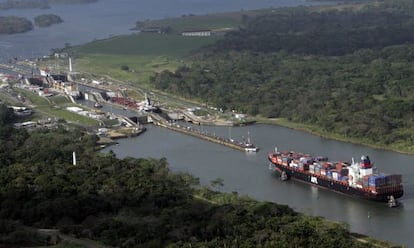Venezuela's debts threaten business in the second largest free port in the world
Business in the Colon Free Zone in Panama to shrink by 10 percent this year

If the Venezuelan and Colombian economies start to falter, the Colón Free Zone (ZLC), a strategic commercial enclave on the Caribbean coast of Panama, could suffer a severe crisis. The second most important free port in the world after Hong Kong is experiencing the domino effect of a currency devaluation in Venezuela and an increase in tariffs in Colombia.
Venezuelan importers who buy in the ZLC owe more than 700 million dollars to their Panamanian providers, a sum other sources estimate to reach 1.2 billion dollars. The phenomenon is startling for Colón because Venezuela is its biggest client with acquisitions reaching, on average, about 30 percent of its total operations each year. The bolivar's decline against the dollar makes it difficult for Venezuelans to buy the American currency they use to pay for imports.
"Venezuela's debt has remained the same," said Surse Pierpoint, the businessman and ex-president of the Colon Free Zone Users Association. "This is a critical issue for Venezuela because of the accounts it has to settle with a number of creditors. We are a low priority on the list for payment, I would guess. No one knows for sure how much they owe because that is not something that would be announced and there are no balance sheets," he told EL PAÍS.
The ZLC has been operating since 1948, moving more than 29 billion dollars each year under a framework that leaves it exempt from certain fiscal regulations.
The area has also felt the effects of Colombia's decision in March to impose a duty on footwear and textile imports. Colombian buyers move about 10 percent of the area's annual business. "We're in a similar situation with Colombia [and Venezuela]," Pierpoint said. " [The Colombian government] is not showing any sign of relaxing the measure despite the fact that the World Trade Organization ruled against it. In August we presented an appeal to the WTO and it was accepted. That means the organization felt there was sufficient evidence to warrant analyzing the case."
The future of the Colon Free Zone is not promising. The situation is "critical and worrying," Pierpoint continued. ZLC operations with Venezuela and Colombia have reached 5 billion dollars in the last few years. The decisions from Caracas and Bogotá will have direct repercussions on Panamanian vendors. These measures are expected to cause a 10 percent loss in commercial activity in the ZLC by the end of the year.
"It's a negative economic cycle," said Severo Souza, the Panamanian businessman and former ex-president of the Colon Free Zone Users Association. "Payments from Venezuela are slow to roll out. Efforts have been made. Some payments have been sent but they go very slowly," he told EL PAÍS. "Many companies, medium-sized ones mostly, cannot wait so long because they have financial commitments with banks and providers and this is having a huge impact on them. They can't restock inventory to sell to others. When they can't sell to Venezuela some of them have to slash prices and liquidate their stocks and sell to other places."
In light of the Venezuelan buyers' crisis, President Ricardo Martinelli of Panama traveled to Caracas last July in an effort to negotiate directly with Venezuelan President Nicolás Maduro. Venezuela devalued its currency in February thereby making the dollar more expensive and making it more difficult for businesses to pay off their purchases abroad with the American currency. The two leaders formed a commission to resolve the problem but the situation went on and now they are in the last trimester of the year - a critical season for businesses in the ZLC. The currency controls from the Venezuelan government pushed back payments to Panamanian vendors and "that has dried up business" and movement through the zone, Martinelli said.
Colombia and Panama signed a Free Trade Agreement last September but they have not yet come to an agreement over tariffs from Bogotá. Panama's Ministry of Commerce and Industry said Colombia has to respect international trade regulations and set up duties consistent with these laws. But, a solution to this problem will be "slow to come," Souza said.
Translation: Dyane Jean François
Tu suscripción se está usando en otro dispositivo
¿Quieres añadir otro usuario a tu suscripción?
Si continúas leyendo en este dispositivo, no se podrá leer en el otro.
FlechaTu suscripción se está usando en otro dispositivo y solo puedes acceder a EL PAÍS desde un dispositivo a la vez.
Si quieres compartir tu cuenta, cambia tu suscripción a la modalidad Premium, así podrás añadir otro usuario. Cada uno accederá con su propia cuenta de email, lo que os permitirá personalizar vuestra experiencia en EL PAÍS.
¿Tienes una suscripción de empresa? Accede aquí para contratar más cuentas.
En el caso de no saber quién está usando tu cuenta, te recomendamos cambiar tu contraseña aquí.
Si decides continuar compartiendo tu cuenta, este mensaje se mostrará en tu dispositivo y en el de la otra persona que está usando tu cuenta de forma indefinida, afectando a tu experiencia de lectura. Puedes consultar aquí los términos y condiciones de la suscripción digital.








































